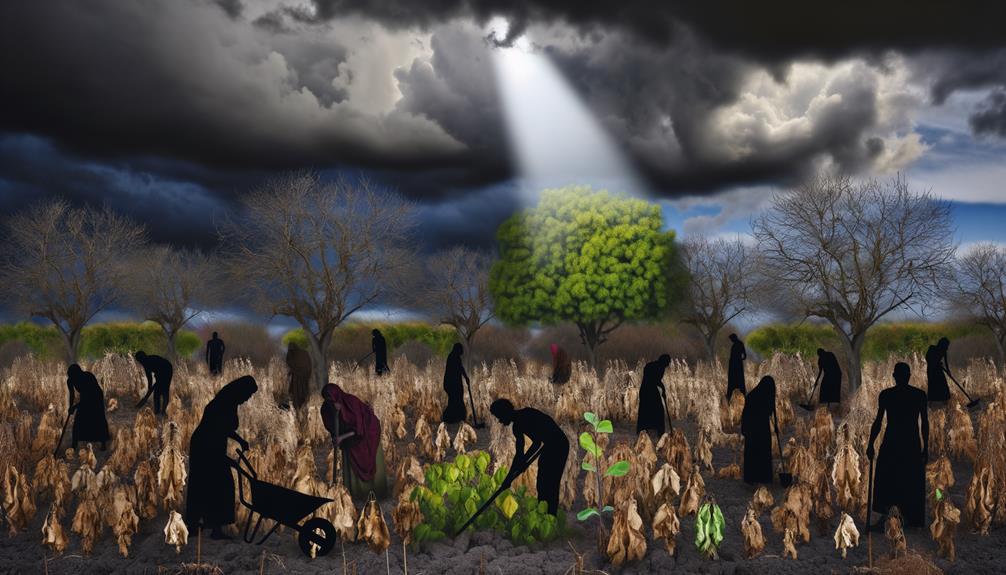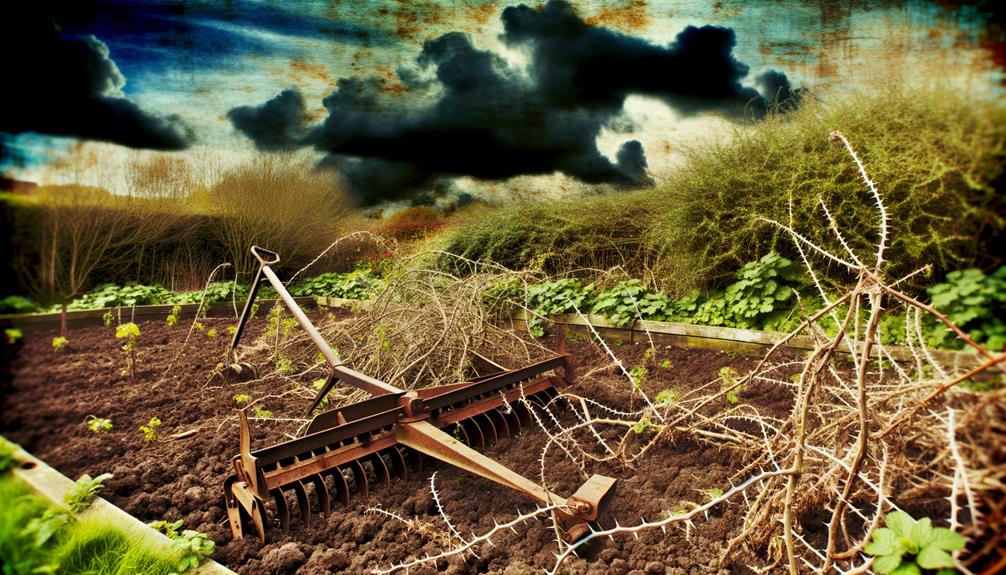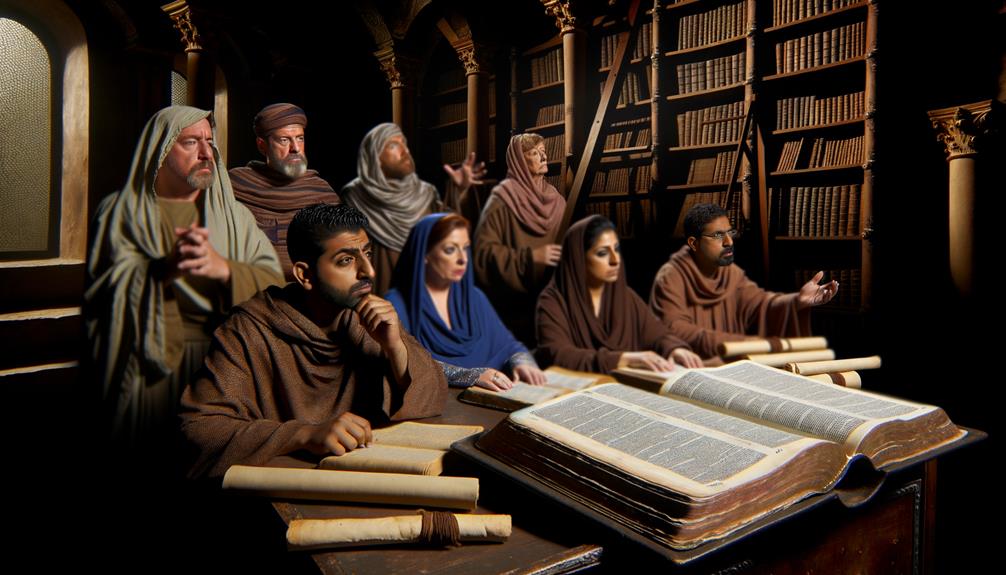Cursed Be the Ground for Our Sake Bible Verse Meaning
Genesis 3:17’s phrase “Cursed be the ground for our sake” encapsulates the divine response to human disobedience, fundamentally altering the human condition and our relationship with creation. The Hebrew term ‘Arur,’ meaning ‘cursed,’ signifies divine disfavor, culminating in a world where sustenance now demands toil and hardship.
This curse not only underscores the rupture caused by original sin but also serves as a stark reminder of the moral and ecological responsibilities bestowed upon humanity. The profound theological implications of this verse extend beyond mere punishment, inviting contemplation on divine justice and human stewardship.
Exploring its broader context reveals further insights.

Cursed Be the Ground for Our Sake Bible Verse Meaning and Insights
| Aspect | Details |
|---|---|
| Bible Reference | Genesis 3:17 |
| Key Themes | Sin, consequence, toil, redemption |
| Symbolism | The cursed ground represents the broken relationship between humanity and creation due to sin |
| Historical Context | Part of the curse following Adam and Eve’s disobedience in Eden |
| Spiritual Insight | Highlights the need for redemption and points to God’s ultimate plan for restoration through Christ |
Context of the Verse

Understanding the context of a Bible verse is essential for accurate interpretation and application.
The phrase ‘Cursed be the ground for our sake’ appears in Genesis 3:17, situated within the narrative of humanity’s fall. This verse is a divine pronouncement following Adam and Eve’s disobedience, highlighting the consequential nature of sin.
Contextually, it underscores the disruption of the harmonious relationship between humanity and creation. The curse signifies a shift from effortless provision to laborious toil.
Analyzing this within the broader theological framework, it reflects the gravity of sin and its pervasive impact.
As a result, understanding the situational and theological context of this verse is vital for grasping its full significance and implications in biblical doctrine. This context not only sheds light on the verse’s original intent but also reveals how it relates to broader themes within scripture, such as covenant, judgment, and hope. When we delve deeper into the implications of God’s warnings and promises, we find that the Jeremiah 11:11 verse explained serves as a pivotal reminder of the consequences of turning away from divine guidance. Ultimately, such an understanding enriches our faith and compels us to reflect on our own commitments within our spiritual journey.
Original Hebrew Text

The term ‘cursed‘ in the original Hebrew text, ‘arur,’ carries profound theological implications, particularly within the context of Genesis.
Its usage not only conveys a state of divine disfavor but also sets the stage for understanding humanity’s existential condition post-Fall.
Analyzing this term within its historical and scriptural context reveals the depth of its impact on human destiny and divine-human relations.
Meaning of “Cursed”
In the original Hebrew text, the term translated as ‘cursed’ is often derived from the root word ‘אָרַר’ (arar), which conveys a sense of being bound or hemmed in by divine judgment. This term is rich with theological implications and provides a profound understanding of the nature of the curse.
- Divine Judgment: ‘Arar’ signifies a formal declaration by God, imposing divine restrictions.
- Consequence: It denotes the aftermath of humanity’s disobedience, reflecting moral and spiritual repercussions.
- Alienation: The term implies a separation from divine favor and blessings.
- Inevitability: It suggests that the curse is an unavoidable result of certain actions.
These facets collectively enhance our comprehension of the term ‘cursed’ in its original context.
Context in Genesis
Exploring the term ‘arar’ within the context of Genesis reveals its pivotal role in articulating the theological and moral dimensions of the human condition post-Fall. The original Hebrew text employs ‘arar’ to denote a profound state of curse imposed upon the ground because of humanity’s disobedience. This term encapsulates not merely a physical alteration but a spiritual and existential shift, reflecting humanity’s fractured relationship with creation and the divine.
| Hebrew Term | Meaning |
|---|---|
| ‘arar’ | To curse |
| ‘adamah’ | Ground |
| ‘ish’ | Man |
| ‘ishshah’ | Woman |
| ‘etz’ | Tree |
Thus, the use of ‘arar’ in Genesis 3:17 underscores the gravity of the Fall and its pervasive impact on all facets of existence.
Implications for Humanity
Understanding the implications of ‘arar’ for humanity necessitates a thorough examination of the original Hebrew text to uncover the profound theological ramifications that the curse entails.
The term ‘arar’ (אָרַר) signifies a divinely sanctioned consequence, reflecting a disrupted relationship between humanity and creation. This curse, articulated in Genesis 3:17, extends beyond mere agricultural hardship to symbolize a broader existential and spiritual alienation.
- Divine Justice: The curse underscores God’s justice in response to human disobedience.
- Human Labor: It emphasizes the toil and suffering inherent in human labor.
- Environmental Impact: The curse affects the natural world, leading to ecological imbalance.
- Theological Reflection: It invites contemplation on the nature of sin and its consequences.
The Fall of Man

The Fall of Man, as narrated in Genesis 3, marks a pivotal moment in Christian theology, signifying the original transgression that introduced sin and estrangement from God into human existence.
This event, precipitated by Adam and Eve’s disobedience in eating the forbidden fruit, represents a fundamental rupture in the divine-human relationship.
Theologically, it underscores the concept of original sin, implying that the fallen state is inherited by all humanity.
This narrative not only elucidates the origins of moral and spiritual suffering but also sets the stage for the necessity of redemption.
The Fall’s repercussions permeate various doctrinal teachings, influencing the understanding of human nature, free will, and divine justice within Christian thought.
The Curse Explained

Following the disobedience of Adam and Eve, the narrative of Genesis 3 continues by detailing the specific curses pronounced by God upon the serpent, the woman, and the man, which encapsulate the profound theological implications of the Fall.
These curses serve as both punitive measures and transformative elements in the human experience, underpinning much of Judeo-Christian thought on sin and redemption.
- The Serpent: Cursed to crawl on its belly and eat dust, symbolizing ultimate humiliation and defeat.
- The Woman: Experiences increased pain in childbirth and a complex relational dynamic with her husband.
- The Man: Faces a cursed ground, leading to arduous labor for sustenance.
- Humanity: Introduced to mortality, signifying a return to dust.
Human Responsibility

Human responsibility, as articulated in biblical scripture, encompasses the stewardship of creation and the consequences of choices.
The doctrine of stewardship mandates that humanity must manage and care for the earth as a divine trust, reflecting an ethical obligation towards environmental sustainability.
Concurrently, scriptural teachings emphasize that choices carry inherent consequences, reinforcing moral accountability and the principle of retributive justice.
Stewardship of Creation
Stewardship of creation embodies a theological mandate that emphasizes humanity’s responsibility to manage and care for the Earth in accordance with divine principles. This concept is deeply rooted in biblical doctrine, asserting that humans are appointed as caretakers of God’s creation. Theologically, it underscores the interconnectedness of all life and the moral imperative to preserve and sustain the environment.
Dominion and Responsibility: Humans are given dominion, not to exploit but to steward creation wisely.
Sustainability: Ensuring the longevity of natural resources reflects respect for divine creation.
Ethical Use: The use of resources should align with moral and ethical considerations.
Intergenerational Justice: Future generations have the right to a healthy environment.
Accountability: Humanity is accountable to God for environmental stewardship.
Consequences of Choices
The choices humanity makes in relation to environmental stewardship carry profound theological and ethical implications, shaping both current ecological conditions and the legacy left for future generations.
The biblical pronouncement ‘Cursed be the ground for our sake’ (Genesis 3:17) underscores the direct correlation between human actions and environmental degradation. This doctrinal perspective emphasizes human responsibility in the stewardship of creation.
Decisions that exploit natural resources without regard for sustainability reflect a disregard for divine mandates. Conversely, choices that promote ecological balance and care for the earth manifest a commitment to these sacred responsibilities.
Consequently, the consequences of human choices are not merely environmental but ethically and theologically significant, impacting both the natural world and spiritual accountability.
Consequences of Sin

Understanding the consequences of sin is essential for comprehending the broader theological framework within which biblical teachings on morality and redemption are situated. Sin, as depicted in the Bible, results not merely in personal guilt but also in a disrupted relationship with God and creation. Theologically, the ramifications of sin extend beyond immediate actions, influencing both spiritual and material domains.
- Separation from God: Sin creates a chasm between humanity and the divine.
- Spiritual Death: Sin leads to a state of spiritual alienation and death.
- Moral Corruption: Sin distorts human nature, leading to moral decay.
- Loss of Innocence: Sin results in the loss of original purity and innocence.
These aspects underscore the gravity of sin within the biblical narrative.
Nature’s Suffering
In addition to its profound impact on the human soul, sin also manifests in the suffering of nature, reflecting a broader disturbance in the created order.
The biblical narrative in Genesis 3:17 elucidates how the ground itself is cursed as a consequence of human transgression. This curse extends beyond mere agricultural hardship, symbolizing a cosmic fracture wherein creation groans under the weight of sin.
The natural world, originally designed for harmonious existence, now experiences decay and disorder. This suffering of nature underscores the pervasive reach of sin, implicating all of creation in its consequences.
Consequently, the environmental degradation and natural calamities observed today can be understood as manifestations of this primordial curse.
Theological Perspectives

The theological perspectives on biblical verses related to suffering often hinge on the consequences of Original Sin, which is seen as the foundational cause of human tribulation.
This framework not only explicates the inherent suffering in human existence but also paves the way for understanding the doctrines of redemption and hope as articulated in Christian theology.
Original Sin’s Consequences
Original sin’s consequences, deeply entrenched in Christian theological discourse, have profound implications for human nature and the doctrine of salvation. The fall of Adam and Eve is seen as the foundational event that introduced sin into the world, affecting all subsequent generations. This theological concept underscores the inherent flawed nature of humanity and the need for divine redemption through Jesus Christ.
Anthropological Implications: Human beings are born with a sinful nature.
Soteriological Necessity: Salvation through Jesus Christ becomes essential.
Ecclesiological Insights: The Church’s role in mediating grace takes on critical importance.
Moral Corruption: Human actions are inherently tainted by sin.
Cosmic Consequences: The natural world is also affected, as seen in the curse upon the ground.
Such perspectives encapsulate the pervasive impact of original sin within Christian doctrine.
Human Suffering Explained
Understanding human suffering through theological perspectives necessitates a thorough examination of doctrinal teachings and scriptural interpretations within the Christian tradition.
Central to this inquiry are the narratives in Genesis, where the fall of man introduces suffering as a consequence of disobedience. Theological exegesis often interprets the curse on the ground (Genesis 3:17) as symbolic of the fractured relationship between humanity and creation.
This suffering is not merely punitive but serves as a reminder of humanity’s dependence on divine grace. Additionally, scholars assert that suffering inculcates virtues such as patience and humility, fostering spiritual growth.
Consequently, human suffering is seen as multifaceted, entwined with both the existential condition of fallen humanity and the divine economy of salvation.
Redemption and Hope
Redemption, as articulated through Christian theology, serves as a cornerstone of hope, anchoring believers in the promise of divine deliverance and eternal life. This theological perspective posits that despite the curse inflicted upon the ground due to human sin, redemption offers a pathway to restoration. It emphasizes the transformative power of Christ’s sacrifice, which transcends the temporal consequences of sin.
- Atonement: Christ’s sacrifice reconciles humanity with God, offering forgiveness and new life.
- New Creation: Believers are promised a renewed creation, free from the curse’s afflictions.
- Eschatological Hope: The end times foresee a return to divine harmony and justice.
- Sanctification Process: Redemption initiates an ongoing spiritual renewal within individuals.
This doctrinal understanding provides profound solace and motivation for believers maneuvering life’s adversities.
Historical Interpretations

Throughout history, biblical verses have been subject to a myriad of interpretations shaped by cultural, theological, and socio-political contexts.
The phrase ‘Cursed be the ground for our sake’ from Genesis 3:17 has been interpreted variously since antiquity.
Early Church Fathers like Augustine viewed it as a divine punishment reflecting humanity’s fall and subsequent toil.
Medieval theologians connected it to the concept of original sin, emphasizing mankind’s responsibility in cultivating a redeemed earth.
During the Reformation, interpreters like Martin Luther saw it as an allegory for human suffering and labor.
These historical interpretations reveal a rich tapestry of thought, reflecting evolving understandings of divine justice, human agency, and the interplay between sin and redemption.
Modern Implications

In contemporary discourse, the interpretation of biblical verses such as ‘Cursed be the ground for our sake’ continues to evolve, reflecting current theological debates, environmental ethics, and socio-economic issues. Modern scholars and theologians explore the verse’s relevance to today’s challenges, proposing multifaceted implications.
Theological Reassessment: Contemporary theologians question traditional interpretations, seeking relevance in modern contexts.
Environmental Stewardship: The verse is examined through the lens of ecological responsibility and sustainability.
Economic Disparities: Discussions include the socio-economic ramifications of environmental degradation on marginalized communities.
Moral Responsibility: Ethical considerations revolve around humanity’s duty to mitigate the curse through righteous living.
Interdisciplinary Dialogue: The verse fosters conversations between theology, science, and social justice to address global issues.
This evolving interpretation underscores the verse’s profound and enduring impact.
Lessons for Today

Examining the verse ‘Cursed be the ground for our sake’ through a contemporary lens provides critical insights into how ancient scriptures can inform and guide modern ethical and social practices.
This biblical admonition underscores the interconnectedness of humanity and the environment, urging stewardship and responsibility. In today’s context, it highlights the consequences of ecological negligence and the moral imperative to pursue sustainable living.
Ethically, the verse challenges individuals and societies to reflect on their actions’ broader impact, fostering a sense of collective accountability. By interpreting this scripture through modern ethical frameworks, we can derive valuable lessons on environmental conservation, social justice, and the importance of nurturing a symbiotic relationship with the earth.
Conclusion
In understanding ‘cursed be the ground for our sake,’ the convergence of context, Hebrew etymology, and theological interpretations coalesce to clarify its connotations.
The curse, a consequence of the Fall, underscores humanity’s responsibility and the resultant ramifications.
Historical hermeneutics and contemporary contemplations contribute to a thorough understanding.
These collective insights illuminate the enduring existential and ethical lessons inherent in the verse, emphasizing humanity’s perpetual struggle with sin, stewardship, and spiritual effort.






